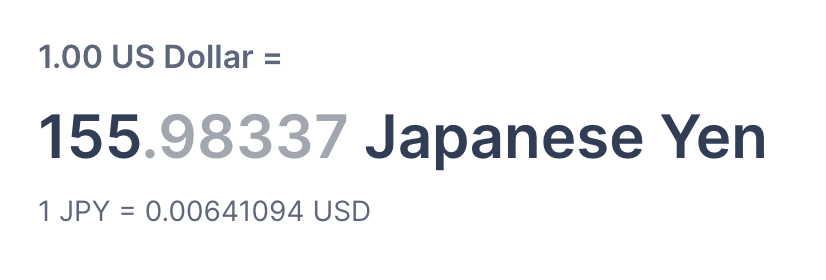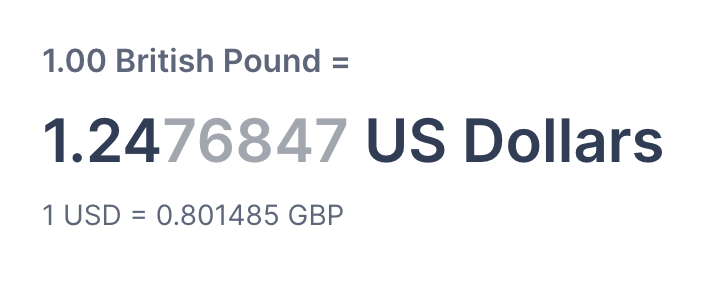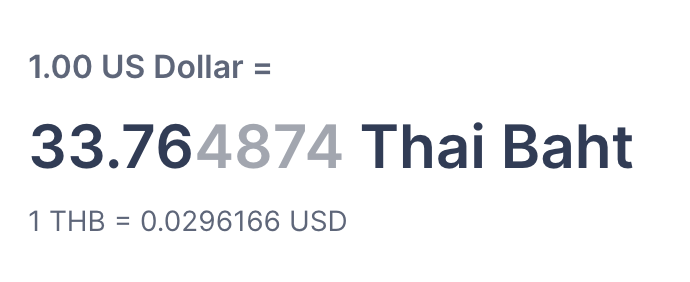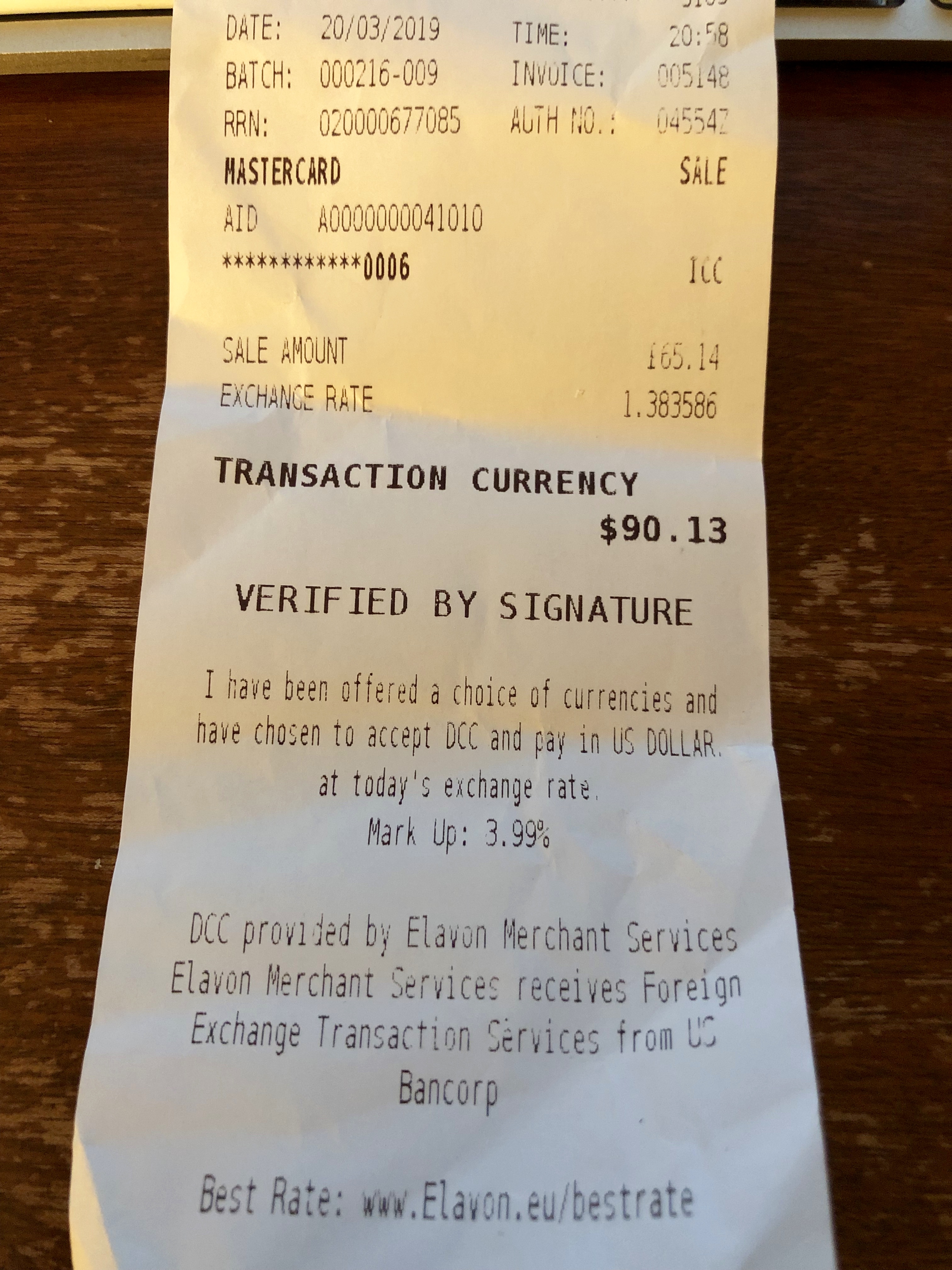When traveling outside of your home country, figuring out how much things cost in relation to your currency can be difficult. You need to know the current conversion rate between the two currencies and then apply that to the purchase price. Sometimes, you can eyeball the price when it’s a simple ratio. For instance, as of January 2025:
The exchange rate for the US Dollar to Japanese Yen (USD/JPY) is 1 USD = 156.51 JPY. If you were buying something that costs 1,500 Yen, that’s roughly $10:

Similarly, the exchange rate for the US Dollar to British Pound (USD/GBP) is 1 USD = 0.80 GBP. If you see something that costs £100, that’s approximately $125. Think of everything as about 25% more expensive than it looks:

Meanwhile, the exchange rate for the US Dollar to Thai Baht (USD/THB) is 1 USD = 33.57 THB. For every 1,000 Baht, you’re spending about $30. Try keeping that math in your head all the time:
Sometimes, however, conversions aren’t so straightforward. Imagine a hotel, restaurant, or gift shop asking if you’d like to pay in local or your home currency. If you’re tired of doing math, you might jump at the chance to pay in your local currency, right?

However, If you ever get this question, ALWAYS PAY IN LOCAL CURRENCY!!!
What is Dynamic Currency Conversion (DCC)?
The service offered is called Dynamic Currency Conversion (DCC), and it’s a total ripoff. The merchant converts the purchase charge to your home currency at an exchange rate of their choosing. This is almost always higher than the currency exchange rate that your bank or credit card would use. If you think this will save you money by avoiding foreign exchange fees, you’re mistaken. That fee is charged for any transaction outside your home country, regardless of the currency used.
I know about this, yet a restaurant we visited in the United Kingdom still tricked me into paying in USD instead of GBP.

Why You Should Avoid Paying in Your Home Currency
Despite what the receipt says, we were never offered a choice of currencies that we remember. It was likely listed on the payment device where we inserted our card to pay the bill.
I used to think this ripoff was only used to overcharge Americans traveling abroad. However, I’ve learned that US merchants also use this scheme to overcharge visitors from other countries.
Tips for Maximizing Your Travel Spending
No matter where you’re from, here’s what you need to do:
- Always make your purchases in local currency.
- Use a credit card that has no foreign exchange fees.
If you’re from the US and traveling abroad, many cards have no exchange fees. If you are traveling from the UK, you also have several options with no foreign transaction fees.
Using a credit card can be advantageous while traveling abroad since the transaction cost will be converted at the bank’s exchange rate at the time of the transaction. The exchange rates banks charge each other are typically more favorable than those offered by local currency exchange services. By using your credit card, you’re likely to get a better rate and save money.
For the most accurate and up-to-date rates, consider using reliable currency converters like OANDA’s Currency Converter or XE Currency Converter.
The Bottom Line: Always Pay in Local Currency
So, if you remember just one thing when traveling overseas (or buying something in a foreign currency), ALWAYS pay in local currency!
Want to comment on this post? Great! Read this first to help ensure it gets approved.
Want to sponsor a post, write something for Your Mileage May Vary, or put ads on our site? Click here for more info.
Like this post? Please share it! We have plenty more just like it and would love it if you decided to hang around and sign up to get emailed notifications of when we post.
Whether you’ve read our articles before or this is the first time you’re stopping by, we’re really glad you’re here and hope you come back to visit again!
This post first appeared on Your Mileage May Vary

7 comments
I always pay in local currency but I never realized that they still charge the foreign transaction fee even if is paid in USD. None of my cards have those fees anymore, but it’s good to know. Also, thankfully I have the Schwab ATM card which refunds all fees because Brazil charged me the equivalent of $19 to take $100 out of an atm!
This is excellent and I always use local currency. I am planning my Peru trip and everything I try booking in listed in USD prices even though it should be in Peruvian Sol. I will be taking Local currency only.
This ripoff was once applied to our sizable bill at the Park Hyatt Sydney. It amounted to 10%! We demanded to speak to a manager and it was corrected while we waited.
China is notorious for this, almost all the big chain hotels automatically charge you is USD or EUR based on your passport – which they require a copy of. You have to catch them before they close out your bill and tell them to charge you in RMB. And yes, when they charge you in USD abroad, your credit card company will also charge you the foreign transaction fee – unless of course you use a card that does not charge that silly fee.
I agree with the conclusions of this article but can point out one exception. In one country, I was offered a lower price if I paid cash in US dollars. Only one merchant made that offer.
As others have said, it’s an issue with hotels in certain countries. In my case, I have that problem when traveling to Turkey, especially with Hilton. I make a reservation way in advance and it’s quoted in Turkish Lira. Then, of course the Lira keeps dropping like a rock the past few years and so when you finally get to the hotel and check out, they charge me in Euro (I’m an American by the way). They never ask me if I want to be charged in Euro, they just do it anyhow to compensate for the falling Lira. My final bill always comes out to more than what it would have been had they charged me for the rate I reserved it at in Lira. I’ve had arguments with the hotel management over this. Really underhanded that they do this.
Absolutely agree! I learned the hard way that paying in local currency is the way to go. Those dynamic currency conversion options can end up costing a lot more than you realize.